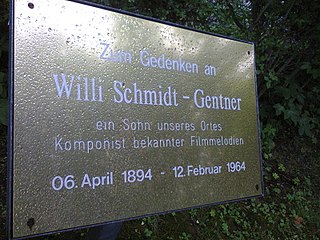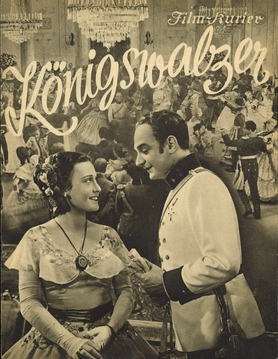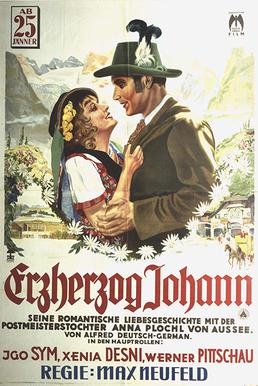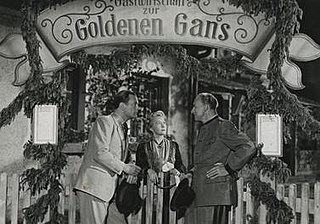Related Research Articles

Cinema of Austria refers to the film industry based in Austria. Austria has had an active cinema industry since the early 20th century when it was the Austro-Hungarian Empire, and that has continued to the present day. Producer Sascha Kolowrat-Krakowsky, producer-director-writer Luise Kolm and the Austro-Hungarian directors Michael Curtiz and Alexander Korda were among the pioneers of early Austrian cinema. Several Austrian directors pursued careers in Weimar Germany and later in the United States, among them Fritz Lang, G. W. Pabst, Josef von Sternberg, Billy Wilder, Fred Zinnemann, and Otto Preminger.

Willi Forst, born Wilhelm Anton Frohs was an Austrian actor, screenwriter, film director, film producer and singer. As a debonair actor he was a darling of the German-speaking film audiences, as a director, one of the most significant makers of the Viennese period musical melodramas and comedies of the 1930s known as Wiener Filme. From the mid-1930s he also recorded many records, largely of sentimental Viennese songs, for the Odeon Records label owned by Carl Lindström AG.

The Sinner is a 1951 West German romantic drama film directed by Willi Forst and starring Hildegard Knef, Gustav Fröhlich and Änne Bruck. It was shot at the Bendestorf Studios and on location in Naples, Rome and Positano. The film's sets were designed by the art director Franz Schroedter.

Willy Schmidt-Gentner was one of the most successful German composers of film music in the history of German-language cinema. He moved to Vienna in 1933. At his most productive, he scored up to 10 films a year, including numerous classics and masterpieces of the German and Austrian cinema.

Lizzi Waldmüller was an Austrian singer and actress whose breakthrough to stardom came through her role as Rachel in the Willi Forst movie Bel Ami in 1939.

The Royal Waltz is a 1935 German musical film directed by Herbert Maisch and starring Paul Hörbiger, Curd Jürgens, and Carola Höhn. It was shot at the Babelsberg Studios of UFA in Berlin. The film's sets were designed by the art directors Robert Herlth and Walter Röhrig. A separate French-language version Royal Waltz was also released. It was remade in 1955 under the same title.
In German film history, an Überläufer is a film that was in production under the Third Reich but only completed and premiered after the end of the Second World War. The vast majority of Uberläufer films are romantic comedies with no reference to the political and military situation of the time.

The Burning Secret is a 1933 Austrian-German drama film directed by Robert Siodmak and starring Alfred Abel, Hilde Wagener and Hans Joachim Schaufuß. It was based on the 1913 novella of the same title by Stefan Zweig. It was released by the German branch of Universal Pictures. It was shot at the EFA Studios in Berlin and on location around Ascona in Switzerland. The film's sets were designed by the art director Robert A. Dietrich.

Gently My Songs Entreat is a 1933 Austrian-German musical film directed by Willi Forst and starring Marta Eggerth, Luise Ullrich and Hans Jaray. The film was shot at the Sievering Studios in Vienna with art direction by Julius von Borsody. The film is a biopic of the composer Franz Schubert (1797–1828). It was Forst's directorial debut. A British version was made called Unfinished Symphony. The German title refers to the first line of the Lied "Ständchen" (Serenade) from Schubert's collection Schwanengesang, "the most famous serenade in the world", which Eggerth performs in the film.

My Heart Calls You is a 1934 German musical film directed by Carmine Gallone and starring Jan Kiepura, Mártha Eggerth and Paul Kemp. Separate English-language and French-language versions were made, both also directed by Gallone.
A Waltz by Strauss is a 1925 Austrian silent film directed by Max Neufeld and starring Eugen Neufeld, Tessy Harrison, and Svet Petrovich.

Vienna, City of My Dreams is a 1957 Austrian musical comedy film directed by Willi Forst and starring Adrian Hoven, Erika Remberg and Hertha Feiler.

Court Theatre is a 1936 Austrian drama film directed by Willi Forst and starring Werner Krauss, Carl Esmond and Hortense Raky.

Knall and Fall as Detectives is a 1953 Austrian-West German comedy film directed by Hans Heinrich and starring Hans Richter, Rudolf Carl, and Ingrid Lutz. It was made as a sequel to the 1952 film Knall and Fall as Imposters. It was shot at the Spandau Studios in Berlin. The film's sets were designed by the art director Rolf Zehetbauer.

I Am Sebastian Ott is a 1939 German crime film directed by Willi Forst and starring Forst, Gustav Diessl and Trude Marlen. Some of the film was shot by the assistant director Viktor Becker. It was shot partly at the Sievering Studios in Vienna. It premiered at the Gloria-Palast in Berlin shortly before the outbreak of the Second World War. The film's sets were designed by the art director Kurt Herlth and Werner Schlichting. The plot revolves around art fraud with Forst playing the dual role of twins, one honest and the other corrupt.

Archduke John is a 1929 Austrian silent historical drama film directed by Max Neufeld and starring Igo Sym, Xenia Desni and Paul Biensfeldt. It portrays the life of Archduke John of Austria, a nineteenth century member of the Habsburg Dynasty.

Kissing Is No Sin is a 1950 Austrian-German comedy film directed by Hubert Marischka and starring Curd Jürgens, Hans Olden and Hans Moser. The film takes its title from the waltz "Küssen ist keine Sünd" in Edmund Eysler's 1903 operetta Bruder Straubinger and features the song in its soundtrack.
In the Line of Duty is a 1917 Austrian silent drama film directed by Jacob Fleck and Luise Fleck and starring Wilhelm Klitsch, Marie Marchal and Karl Baumgartner.
Anny Miletty (1898–1948) was an Austrian film actress of the silent era, best known for her role in the 1924 film The City Without Jews. In 1925 she married the film director Hans Karl Breslauer and ended her film career.
References
- ↑ Reimer & Reimer, p. 44.
- ↑ Von Dassanowsky, p. 32.